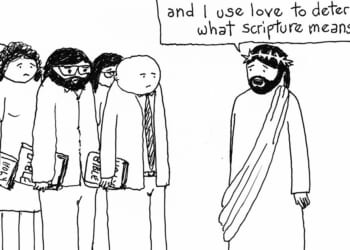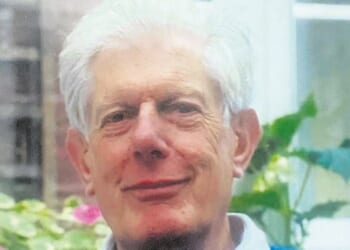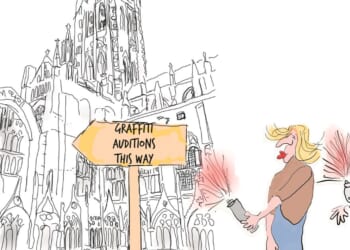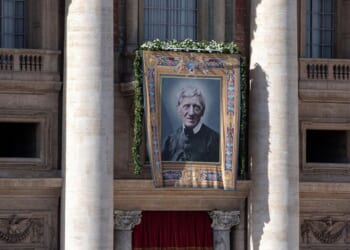“Humankind cannot bear very much reality.” — T. S. Eliot, Four Quartets
MANY years ago, travelling across North America on a Greyhound bus, I opened a book that changed the direction of my life. It was The Road Less Traveled by the psychiatrist M. Scott Peck. It began with a single, piercing sentence: “Life is difficult.” Peck explained that this is a great truth, because it is through the pain of facing and solving our problems that we learn and grow.
I remember sitting on that bus, the fields blurring past the window, feeling something shift inside me. I was in pain, unsure how to hold my life together. His words reached me like a quiet instruction: stop running; turn and face what is real. I understood then that, if I was to grow, I would need to meet life head-on rather than evade it.
That moment began a long calling — one that led me to train as a psychotherapist and to accompany others through their own valleys of confusion and suffering. Over time, I came to see what my first teacher later told me: process matters. To live truthfully is to stay with the process of reality, however uncomfortable.
Peck, in 1978, seems prophetic: “Some of us will go to quite extraordinary lengths to avoid our problems and the suffering they cause, building the most elaborate fantasies in which to live — sometimes to the total exclusion of reality.” The denial and distraction that we see today are not just personal, but cultural, political, even planetary. We see it in the bombardment of online outrage, the erosion of nuance, and the ways in which climate warnings are ignored despite overwhelming evidence.
Our collective refusal to face reality has grown into one of the great spiritual crises of our age. When something feels unbearable, we tend to swing to one of two extremes. One is over-involvement: we rush to fix, to rescue, to make pain disappear. The impulse may come from care, but it can mask our own inability to bear suffering. Left unchecked, it becomes frantic or controlling; we can do harm or simply burn out.
The other is avoidance: we numb, distract, or deny. We turn away, telling ourselves stories to protect us from what feels like too much. These trauma-survival strategies are deeply human, but they do not bring healing. They keep us circling the edges of truth rather than entering it.
In the consulting room, I sometimes see both tendencies in one session: a client surging with frenetic energy to fix everyone else’s pain, then falling silent, unable to name their own. Reality stretches us between doing and denial, between noisy self-assertion and frozen despair. The work of truth is to stay long enough in that space for meaning to emerge.
THE wider world mirrors this pattern. The 24-hour news cycle and social-media algorithms keep us in constant reaction. We are encouraged to take sides before we have paused to think — mistaking certainty for being right.
But truth is not fast: it is slow, layered, and demanding. Facing it is less like winning a sprint than running a long, patient race. Without humility, the effort can destroy us; without silence and reflection, we collapse into distortion or denial.
We live in a culture that prizes assertion over attentiveness, performance over depth. To admit that we are wrong feels like failure; to pause for discernment perhaps feels like weakness. Yet it can be liberating, though painful, to acknowledge that we are lost, that we have made a mistake. Spiritual maturity begins there — in the willingness to say, “I do not know,” and to listen again.
Humility is not timidity or weakness: it is the courage to stand before the vastness of reality — and before God — without trying to control it. One moment of cosmic wonder each day reminds us that we do not make truth, or will it: we serve it.
In my work, I see how relief begins when pain and failure is named, including my own. When I say, “I see you’re angry, and I sense how deeply sad you are,” a person’s shoulders may drop in relief — the painful grief of relief. We need witnesses. The Greek dramatists did not depict violence on stage, but allowed the chorus or messenger to mediate it, helping the audience bear what was unbearable.
In our own time, the journalist, pastor, teacher, or friend can play that same part — not turning away, not sensationalising, but holding reality faithfully, like a mirror. When the BBC correspondent Jeremy Bowen flew over bomb-shattered Gaza and was forbidden to take photographs, he had to find words instead. To witness truthfully is a sacred act.
And when truth is spoken with reverence, something shifts. The person who suffers feels less alone. It might not be easy to hear, when out of control, another person say, “You have lost your moral compass,” but sometimes tough, true words at the right moment are necessary. The listener glimpses what compassion really means: to see and name what is there, thoughtfully. Truth begins its freeing work when what was hidden is brought into the light, and what was silenced is heard.
We stand again, as Yeats wrote after the First World War, in a time when “things fall apart; the centre cannot hold.” Passionate intensity fills the airwaves, while quiet wisdom struggles to be heard. I long for cool water in what feels like a desert in our public life — not louder certainty or repetition, but deeper humility. We see it when thoughtful local leaders act patiently to protect communities during crises, or when policymakers quietly enact measures that uphold human dignity despite political pressure. People willing to discern what truly matters, naming values clearly, show how principles can guide action.
True expertise does not trumpet itself: it listens. It is not self-indulgent to look within and be honest about our shadows. Only by acknowledging our inner storms can we find peace — not by erasing them, but with the restraint of recognising them and not acting from them.
ALL this brings me back to that bus journey long ago, and to the moment when a book told me that life is difficult — and that this, somehow, is good news. To face reality honestly is not to be crushed by it, but to be set free through it. Christ’s words still echo: “You will know the truth, and the truth will set you free.”
Freedom does not come from denying suffering, or trying to control outcomes. It comes from consenting to reality as it is, moment by moment, and trusting that, in doing so, we draw closer to God’s truth. Therapeutic practice mirrors this slow unveiling, revealing insight little by little, step by careful step. As Emily Dickinson wrote, “Tell all the truth but tell it slant” — sometimes truth can be borne only gradually, gently, until we are ready to receive it.
On Aldeburgh beach, Maggi Hambling’s great scallop shell (see photo) bears the line from Britten’s Peter Grimes: “I hear those voices that will not be drowned.” To listen to such vulnerable voices — our own, our neighbour’s, the world’s — is a spiritual discipline. It means standing still amid the noise, bearing just enough reality to hear what is true.
Perhaps that is where faith begins: not in certainty, but in attentive presence; not in mastery, but in humility. If we can bear even a little more reality, we may glimpse again the truth that sets us free.
Philippa Smethurst is a trauma-specialist psychotherapist. Her latest book, 20 Ways to Break Free from Trauma, is published by Jessica Kingsley. philippasmethurst.com

















